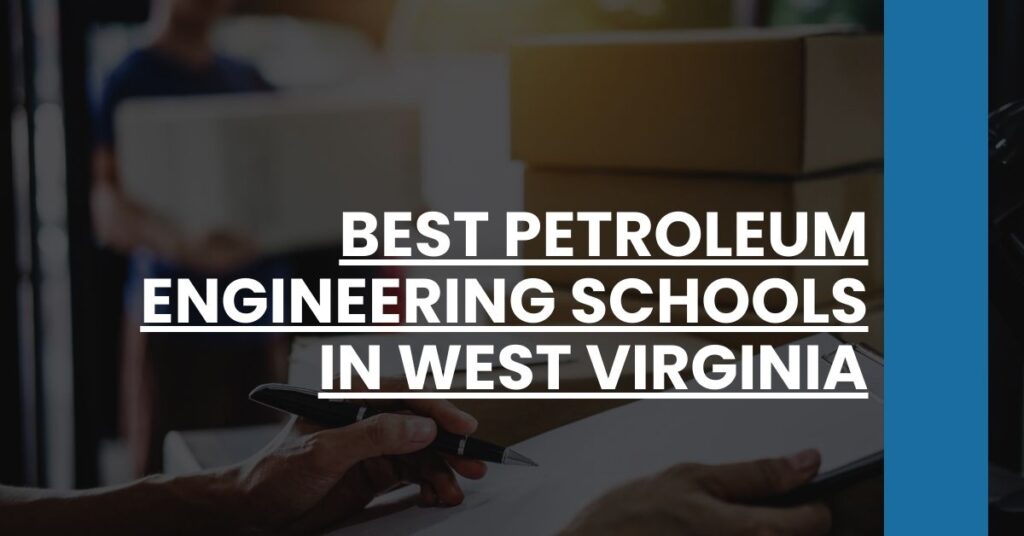Looking for schools in a specific city? Check out our lists of Engineering Schools in Charleston and Huntington.
Choosing the best petroleum engineering schools in West Virginia can feel overwhelming, especially with so many factors to consider.
You might be wondering if investing your time and money in this field will really pay off. We understand how important this decision is for your future. That’s why I’ve worked with our team to create a thorough guide just for you.
In it, you’ll find:
- An overview of the best petroleum engineering schools in West Virginia.
- Benefits of studying in West Virginia, such as unique geological features and strong industry connections.
- Detailed information about programs, faculty, research opportunities, and financial aid.
Why Consider a Petroleum Engineering School in West Virginia?
Unique Geological Features
West Virginia offers a distinctive advantage due to its rich geological landscape. The state’s vast deposits of natural gas and petroleum provide an exceptional environment for hands-on learning. Field studies conducted here are more than just academic exercises; they enable students to interact with real-world geological formations and extraction processes.
- Practical Experience: Students gain direct exposure to industry practices, enhancing their understanding of geological structures and their impact on petroleum extraction.
- Research Opportunities: Engaging directly with the local geological features allows students to conduct significant, meaningful research.
Industry Connections
West Virginia is home to robust connections with major petroleum and natural gas companies, such as Chevron and Halliburton. These connections open doors to vital internship and employment opportunities post-graduation.
- Internships: Strong ties with these companies mean internships are readily available, providing crucial real-world experience.
- Employment: The high demand for skilled petroleum engineers in the region ensures promising employment prospects for graduates.
Competitive Salaries
Petroleum engineers are in high demand both locally and nationally, translating to competitive salaries and job stability. For example, West Virginia University (WVU) boasts a 97% placement rate for graduates in engineering fields.
- Job Security: The high demand ensures stable employment.
- Lucrative Careers: Competitive salaries make the investment in education worthwhile.
West Virginia University (WVU)
Rigorous Curriculum
WVU’s petroleum engineering program is well-recognized. It offers an array of specialized courses designed to equip students with essential skills and knowledge.
- Fundamental Courses: The curriculum includes formation evaluation, fluid mechanics, and reservoir engineering.
- Advanced Programs: Programs such as the M.S. in Midstream Petroleum Engineering and the Ph.D. in Petroleum and Natural Gas Engineering cater to different academic and career goals.
Esteemed Faculty
The program boasts a distinguished faculty renowned for both academic and practical expertise. Key figures include:
- Samuel Ameri: An expert in formation evaluation.
- Shahab Mohaghegh: Specializes in intelligent systems for shale analytics.
Research and Industry Partnerships
WVU collaborates with various industry players, facilitating real-world projects and research. This ensures that the academic learning is complemented by practical application.
- Industry Collaborations: Projects conducted with Chevron and Halliburton.
- Research Projects: Focus on unconventional oil and gas resources, hydraulic fracturing, and reservoir simulation.
Accreditation and Curriculum Standards
Importance of Accreditation
Accreditation is vital as it ensures the program meets high-quality educational standards. ABET accreditation, in particular, signals that the program adheres to stringent educational requirements.
- Quality Assurance: ABET accreditation ensures a standard of excellence.
- Curriculum Requirements: Key areas include mathematics, thermodynamics, well systems design, and reservoir engineering.
Adherence to Standards
West Virginia’s petroleum engineering programs, such as those at WVU, strictly follow these standards. This adherence ensures students receive a recognized and highly respected education.
- Comprehensive Curriculum: WVU follows ABET guidelines rigorously.
- Expert Faculty: Faculty members with substantial industry and academic experience lead the programs.
Looking for more Engineering information? Check out our FE practice tests, find engineering schools near you, learn how to become an engineer, explore options for online engineering degrees.
Looking for Petroleum Engineer School Information On States Bordering West Virginia?
In addition to West Virginia, we suggest looking for schools in nearby states.
- Best Petroleum Engineering Schools In Virginia
- Best Petroleum Engineering Schools In Kentucky
- Best Petroleum Engineering Schools In Ohio
- Best Petroleum Engineering Schools In Pennsylvania
- Best Petroleum Engineering Schools In Maryland
Research Opportunities and Facilities
State-of-the-Art Facilities
WVU offers cutting-edge research facilities that allow for sophisticated study and experimentation. These facilities provide students with the tools they need to conduct ground-breaking research.
- Advanced Labs: Laboratories dedicated to petroleum transport, storage, and processing systems.
- Shared Research Facilities (SRF): Multidisciplinary labs focusing on material characterization and nanotechnology.
Hands-On Field Studies
Field studies play a pivotal role in the practical education of petroleum engineering students. In West Virginia, these studies are particularly valuable due to the state’s rich natural resources.
- Practical Learning: Field studies that allow for real-world application of theoretical knowledge.
- Collaborative Research: Collaborative projects with industry giants enhance learning and professional experience.
